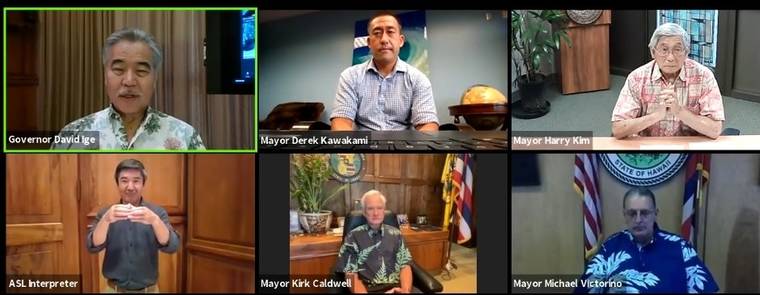The county Planning Department has finally been able to process almost all the approximately 4,000 short term vacation rental applications it received following last year’s implementation of a mandatory registration system.
But it may be months before the newly approved rentals — or any short-term rentals other than hotels — will be allowed to operate, under emergency proclamations from Gov. David Ige and Mayor Harry Kim. Until travel restrictions are lifted, the rentals can be used only to house tenants who were already there when the restrictions went into effect or workers of essential businesses or operations, such as first responders.
Vacation rental occupancy statewide was just 5% in April, the first month after the March 26 mandatory 14-day quarantine for travelers, according to data provided by the Hawaii Tourism Authority. That compares to 8.9% occupancy at hotels, which were allowed to stay open, under the rules.
Kauai, with a 10% occupancy rate, and Kona, with 6.4%, topped the state in occupancy rates. Hilo/Honokaa, the only other Big Island breakdown, was at the low end of the state with 4.9%. That’s well below the Big Island’s 64.7% occupancy in April, 2019.
Ige punted a question about reopening the rentals to the county mayors during a Zoom community session Thursday.
And it was obvious from their responses that vacation rentals are way down the list as businesses are slowly allowed to reopen. In fact, some mayors seemed to hope they wouldn’t reopen at all, especially in residential areas.
Honolulu Mayor Kirk Caldwell estimated 800 legal vacation rentals on Oahu and another 8,000 operating illegally.
“As we come back to new normal, (they) should be in resort areas and not in our neighborhoods,” Caldwell said.
Maui Mayor Mike Victorino agreed. He’d like to be able to keep visitors in the resort areas of his county and not “utilizing our residential facilities.”
Victorino said he wants to “make sure our hotels, our resorts, open first and allow them to reestablish themselves. … We have a large number of illegal vacation rentals and many are closing them down,” he said.
Kauai Mayor Derek Kawakami said the Planning Department on his island is working with police and National Guard to ensure the transient rentals aren’t taking tenants.
Kim also didn’t think the rentals will be allowed to open soon.
“Yes, we need tourism, yes they’re a basic economic industry here, but everyone should know, this is our home,” Kim said. “Our priority is the safety of the people in the state. Everything else has to come second.”
County Planning Director Michael Yee said his office has received complaints from concerned neighbors that some transient rentals may still be open or still taking reservations.
“I think people have been upset,” Yee said. “In most cases, it hasn’t warranted enforcement under the procedures.”
He said the department has hired two inspectors to enforce the vacation rental law, but they can’t go onto property and ask for IDs to prove people live there or not.
“There is a process we have to follow which is never as fast as people want,” Yee said. “We don’t have the authority to actually stop someone from doing it.”
Yee said investigation into complaints about vacation rentals continuing to advertise almost always show they’ve blocked out the dates through June 30, the latest deadline for the emergency rules.
About 1,000 of the 4,000 applications included applications for a nonconforming use certificate to operate in a disallowed zoning classification. Those have to be renewed annually, and renewal applications are already starting to trickle in. That requirement helps regulate the ones out there, especially compared to when the county had no vacation rental law at all, Yee said.
“Although people may be unhappy about short-term vacation rentals in nonconforming areas, at least the county adopted a renewal process so if there is a bad actor, there is a mechanism in place to deal with it,” Yee said.
On the bright side, the county’s backlog of building permits has been whittled down so that what previously took as much as a month or more has been reduced to a week or two. Building permits took a big hit last summer, when vacation rental applicants were scrambling to get their permits in order to meet the September application deadline.
“There were a lot of building permits that certainly got behind during the vacation rental registration period. During this period of COVID crisis, we have been able to catch up on many of our backlogged building permits,” Yee said. “That was certainly a positive during this challenging time for this department.”






